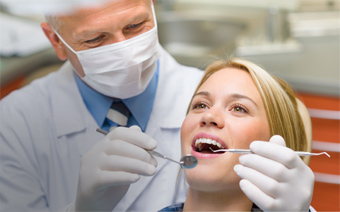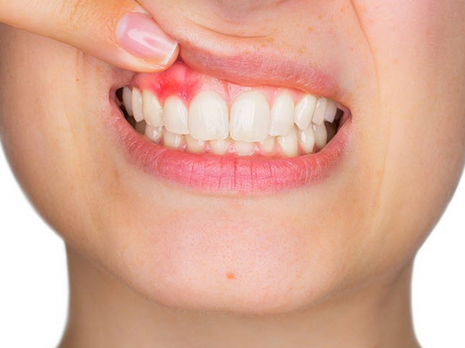INFLAMED BLEEDING GUMS?


DO YOU HAVE INFLAMED BLEEDING GUMS?
Paying attention to your gums is extremely important for your oral and overall health. Bleeding gums is the most common symptom of gum disease but at the same time it can be the indication or result of other health problems. If your gums bleed often while brushing, it would be a good idea to see a dentist. Gingivitis or Gum disease is a serious cause of gum bleeding but there are number of other reasons that could be the cause of your gum problems. The good news is you don’t have to live with inflamed bleeding gums since there are numerous ways to treat it.
Gum disease or Gingivitis is inflammation of the gums caused by bacterial infection. In the absence of proper oral hygiene, bacteria in the mouth form plaque on teeth. These bacteria may also cause your gums to become inflamed resulting in red swollen bleeding gums. If gingivitis is left untreated, it can cause periodontitis (more serious gum infection). Always talk to your dentist if you are experiencing the following:
- Red swollen bleeding gums
- Receding gums
- Bad breath or bad taste
- Loose teeth
- If your gums bleed during or after brushing
- If your teeth are not biting properly or you have loose partial dentures
- Formation of deep pockets in between your teeth and gums


As we all know flossing at least once a day helps removing the plaque and food particles from in-between the teeth where toothbrush can’t reach. Make sure to be gentle while flossing your teeth. Do not force the floss, try to follow the curve of your teeth and slide it in gently while looking in the mirror.
Gums and brushing
To clean teeth, we sometimes go overboard by brushing our teeth too hard or vigorously. This can damage tooth enamel and the gums. Always brush gently with a soft toothbrush. Try to brush in gentle circular motions. Using an electric toothbrush with small soft brush head can also help. Remember, we are trying to remove soft plaque and food particles from the teeth which requires soft gentle brushing.
Gums and Chemotherapy
People undergoing treatment for cancer can also experience bleeding swollen gums as one of the unpleasant side effects of chemotherapy.
Gums and hormones
Some women experience swollen bleeding gums during puberty, mensuration, menopause and pregnancy.
Use of tobacco products
Smoking and using tobacco can damage your gums. People who smoke are more likely to suffer from gum disease. This can cause sensitive, sore bleeding gums which can lead to sores.
Ten Tips to prevent red, swollen, bleeding gums
- Brush your teeth twice a day – Make sure you brush your teeth twice a day following proper brushing technique. If you are not sure, please ask your dentist to show you how to brush properly.
- Floss diligently – Flossing only takes a couple of minutes but can save you from cavities in between your teeth and gum problems. Once you start flossing regularly you will feel the difference. Next time you visit your dentist, ask them to show you how to floss properly.
- Drink plenty of water – Drinking water after eating helps in removing the food particles from your teeth and less chance of bacteria forming plaque damaging your teeth.
- No smoking – Try to quit smoking and intake of other tobacco products.
- Rinse with mouthwash – After consulting your dentist, see if using an antiseptic mouthwash daily can help reduce bacteria which cause gum-disease.
- Improve your nutrition – Eating a balanced diet which includes calcium and vitamin C can help minimise the chances of gum-disease. Commit to the diet that is low in sugars and high in nutrients found in fresh fruit and Vegetables. After having sweet snacks, brush your teeth thoroughly so that sugars are not sticking to your teeth for long periods of time.
- Be careful about too hot or too cold foods – when you have problems like sensitivity, sore gums, try to avoid too hot or too cold foods. Lukewarm or cool foods might be a comfortable option.
- Consider your medication – Some medication like over the counter painkillers; aspirin (blood thinner) can increase bleeding. Other medication can also cause bleeding gums. Always consult your doctor if you think your medication is causing your gums to bleed, your doctor might change the medication or dose.
- De-Stress – Stress can raise levels of the stress hormone cortisol, which can affect our whole body and oral health. Try to relax
- See your Dentist – If you are still experiencing red swollen bleeding gums, your next step should be seeing a dentist. Your dentist will examine your teeth and gums, will take x-rays to determine your condition. In case you have calculus build up on your teeth, your dentist will scale and clean your teeth. If deep periodontal cleaning or surgery is required, your dentist will refer you to the Periodontist who specialise in treating gum disease.
FOR MORE INFORMATION, PLEASE CONATCT OUR CARING DENTAL TEAM ON 38783384
WE PROMISE, “A GENTLE CARING DENTAL EXPERIENCE.”
